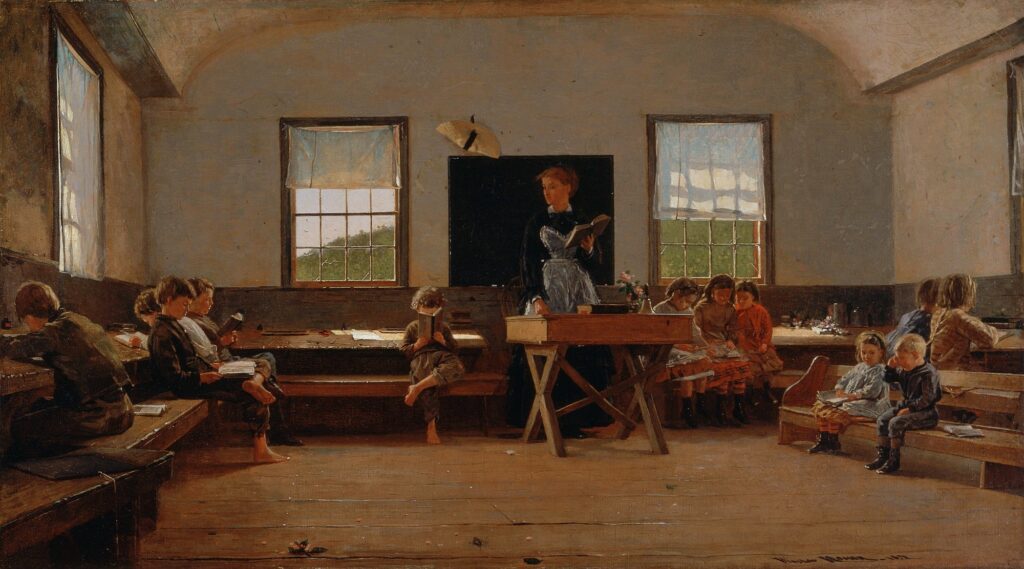
Monday
In celebration of a school year that is beginning or has begun, hopefully with the health of the students prioritized, here’s a poem by Scottish poet and former British poet laureate Carol Ann Duffy. Unlike many school poems (check out my post on this one by William Blake), “In Mrs. Tilscher’s Class” is overwhelmingly positive. One dreams of school being like this.
Maybe I should qualify that slightly as there are slight disturbances in the otherwise calm surface of the school. I’m not sure exactly why Duffy mentions Brady and Hindley, given that they were two mass murderers who sexually assaulted and killed five kids from 10-17 years of age around Manchester in the 1960s. Maybe the story floats around, faded but still present, like the smudge left by someone trying to erase a mistake.
And then there are the frogs propagating and your parents having sex, which becomes even more frightening and disgusting because Mrs. Tilscher, who will talk about everything else, won’t talk about this. Withheld knowledge takes on a force of its own, filling the air with electricity, and one feels oppressed and out of sorts under the “heavy, sexy sky.” No wonder the child is “impatient to be grown.” Children long for knowledge, which they hope will banish their fears.
Meanwhile, a thunderstorm is prepared to unleash upon them the full force of adulthood. Better to dream of traveling up the Nile and visiting exotic foreign lands:
You could travel up the Blue Nile
with your finger, tracing the route
while Mrs Tilscher chanted the scenery.
Tana. Ethiopia. Khartoum. Aswân.
That for an hour, then a skittle of milk
and the chalky Pyramids rubbed into dust.
A window opened with a long pole.
The laugh of a bell swung by a running child.This was better than home. Enthralling books.
The classroom glowed like a sweet shop.
Sugar paper. Colored shapes. Brady and Hindley
faded, like the faint, uneasy smudge of a mistake.
Mrs Tilscher loved you. Some mornings, you found
she’d left a good gold star by your name.
The scent of a pencil slowly, carefully, shaved.
A xylophone’s nonsense heard from another form.Over the Easter term, the inky tadpoles changed
from commas into exclamation marks. Three frogs
hopped in the playground, freed by a dunce,
followed by a line of kids, jumping and croaking
away from the lunch queue. A rough boy
told you how you were born. You kicked him, but stared
at your parents, appalled, when you got back home.That feverish July, the air tasted of electricity.
A tangible alarm made you always untidy, hot,
fractious under the heavy, sexy sky. You asked her
how you were born and Mrs Tilscher smiled,
then turned away. Reports were handed out.
You ran through the gates, impatient to be grown,
as the sky split open into a thunderstorm.
Duffy may be alluding to Thomas Grey’s “Ode to a Distant Prospect of Eton College” in that last image. There the poet, who is sitting on a hill watching students play, can see what they cannot: an approaching thunderstorm. Before it strikes, they are carefree and gay:
Gay hope is theirs by fancy fed,
Less pleasing when possest;
The tear forgot as soon as shed,
The sunshine of the breast:
Theirs buxom health of rosy hue,
Wild wit, invention ever-new,
And lively cheer of vigour born;
The thoughtless day, the easy night,
The spirits pure, the slumbers light,
That fly th’ approach of morn.
This, however, is followed by one of the grimmest stanzas in English literature:
Alas, regardless of their doom,
The little victims play!
No sense have they of ills to come,
Nor care beyond to-day:
Yet see how all around ’em wait
The ministers of human fate,
And black Misfortune’s baleful train!
Ah, show them where in ambush stand
To seize their prey the murth’rous band!
Ah, tell them they are men!
I remember, in first grade, singing “School days, school days, dear old golden rule days.” The nostalgia in the song confused me then and now I understand why. Like “In Mrs. Tilscher’s Class,” it was written by adults remembering back.

